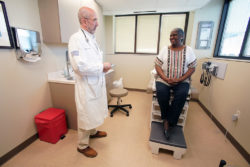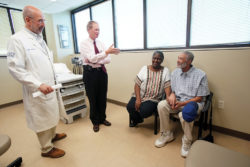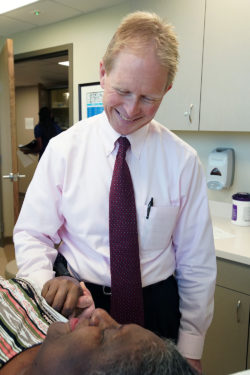Baptist’s Doctors Create New Screening Program to Detect ‘Silent’ Cancers Early

Baptist Collaboration Leads to Early Diagnosis of ‘Silent’ Cancers
An incidental screening program helps Baptist Memorial Health Care doctors take aim at abdominal cancer. Abdominal cancers affect multiple organs in the body, including the liver, pancreas and stomach. According to The Ohio State University, doctors diagnose more than 250,000 cases of abdominal cancer annually in the United States.
Baptist’s Abdominal Nodule Screening Program is unique to the region and is a partnership between MidSouth Imaging, Baptist Memorial Hospital-Memphis and Baptist Cancer Center. Launched in 2017, the program is designed to identify and treat abdominal cancers by leveraging leading-edge software to optimize the collaboration between radiologists and surgeons.
Detecting Cancer and Acting Fast
When Memphis resident Carolyn Dickson visited her primary care physician earlier this year, she received news no one wants to hear.
“We found cancer when we weren’t looking for it,” said Dickson. “I didn’t have cancer symptoms. It’s very scary to hear the words, ‘You have cancer.’”
Dickson, a lifelong Memphis resident, works for the Internal Revenue Service. She has three children, six grandchildren and two great-grandchildren. While longevity runs in her family, so does cancer.
“I care for my mom, who just turned 100 years old,” said Dickson. “I have aunts and uncles who are in their 90s. My cancer diagnosis at age 69 really threw me for a loop.”
When her doctor ordered a CT scan, the radiologist noticed a nodule on Dickson’s liver. As part of the screening program, radiologists add specific language to their dictation report using Baptist’s electronic health records system. The software flags such words as “nodule,” “lesion” and “suspicious” to ensure doctors analyze the images right away.
Doctors studied the image of Dickson’s liver and ordered a biopsy, which revealed she had stage 4 cancer that had metastasized from her colon.
“She was completely unaware she had cancer,” said Dr. Stephen Behrman, surgical oncologist at Baptist Cancer Center. “Thanks to this program, we caught it. We got her into surgery right away and removed her colon cancer and part of her liver. If we didn’t have this program in place, I suspect her treatment would have been delayed significantly.”
Today, Dickson is recovering at home and receiving chemotherapy.
“I’m extremely blessed,” said Dickson. “I’m doing well. I was in the hospital for eight days. I saw my team of doctors every day — oncologists, surgeons, everyone. They all came by and checked on me. You don’t get that level of care everywhere. I’m so grateful to this remarkable team of doctors who not only found the cancer but also took immediate steps to prolong my life.”
A New Process With Life-Changing Results
So far, the program has helped radiologists and surgeons find two cancers in 2019. In 2018, Baptist’s doctors screened 257 patients, found 34 abnormalities and diagnosed 15 cancers.
Behrman works closely with Dr. Ahmad Bashar Abdulkarim, a liver surgeon with Baptist Medical Group. They also monitor 30–40 patients in the electronic system on a regular basis.
“Dr. Abdulkarim and I follow patients with other liver and pancreas abnormalities,” said Behrman. “We don’t need to immediately operate on these patients, but we follow them closely because they may need surgery in the future.”
Pancreas, liver and stomach cancers are often called silent cancers. Many patients don’t experience symptoms until their cancer reaches an advanced stage. The program is designed to analyze data from patients who receive a CT scan at any Baptist Memorial Hospital.
- Celena Jones, Abdominal Nodule Patient, Baptist Memorial Hospital. © Karen Pulfer Focht
- Celena Jones, Abdominal Nodule Patient, Baptist Memorial Hospital. © Karen Pulfer Focht
- Celena Jones, Abdominal Nodule Patient, Baptist Memorial Hospital. © Karen Pulfer Focht
“If you visit the emergency department with a broken rib after a car accident, you’ll receive a CT scan,” said Behrman. “If the scan shows lesions on your stomach — that’s a red flag. The car accident didn’t cause the lesions. While we need to address your broken rib right away, we also want to ensure we don’t overlook your stomach lesions.”
The program has been a gratifying experience for Behrman and his colleagues.
“The screening program and its software help our team move quickly,” said Behrman. “Our gastrointestinal multidisciplinary clinic includes surgical, medical and radiation oncologists; genetic counselors; social workers; nutritionists; surgeons; radiologists; and pathologists. We meet once a week to ensure all our patients have rapidly developed treatment plans.”
For patients like Dickson, treatment is a critical first step on a long journey.
“I’ll receive six months of chemotherapy,” said Dickson. “At the end, I hope I’ll be cancer free. I already feel like Dr. Behrman and Dr. Abdulkarim saved my life. The work they do is phenomenal. The program Baptist made is remarkable. I truly believe they’ve been put here to save lives.”
Visit our website to learn more about Baptist Cancer Center. Find a doctor by visiting our Find a Doctor page.



